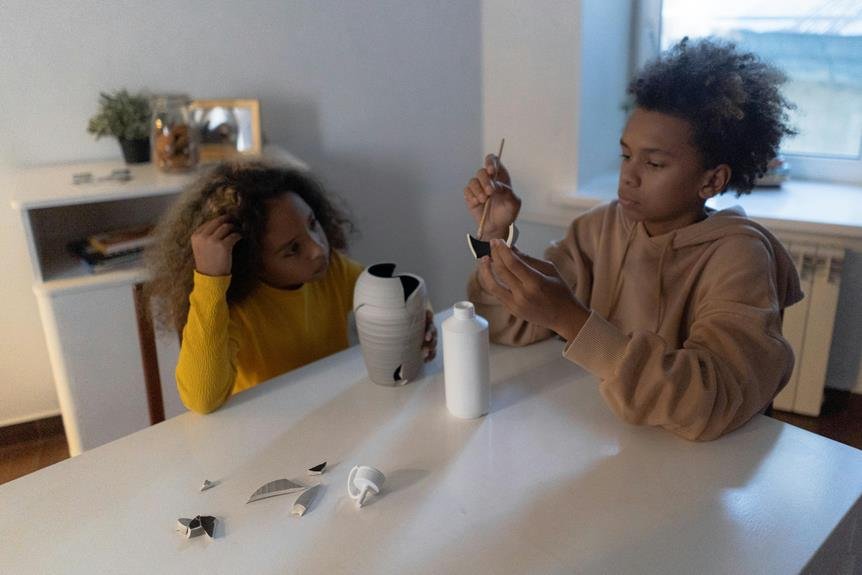When choosing between contact adhesive and super glue, consider the following factors: adhesion strength, application versatility, drying time, bonding surfaces, flexibility, moisture resistance, toxicity, safety, and cost-effectiveness. Super glue excels in strong adhesion and quick drying, ideal for urgent fixes, while contact adhesive offers more flexibility and moisture resistance. Both have safety considerations, but super glue can be more toxic. Assess your needs based on these factors to determine which adhesive suits your specific project best. Understanding these distinctions will help you make an informed decision on the better option for your bonding requirements.
A Quick Overview
- Super glue: known for its superior adhesion strength, perfect for robust bonding needs.
- Contact adhesive: offers more flexibility for various bonding applications.
- Consider moisture resistance: contact adhesive excels in wet environments.
- Super glue dries rapidly, making it ideal for quick fixes and urgent repairs.
- Cost-effective: super glue requires less product due to its high bonding strength.
Adhesion Strength
When comparing adhesive and super glue, the adhesion strength of each product plays an important role in determining their effectiveness.
Adhesive durability is essential when bonding materials together, ensuring a strong and lasting connection.
Super glue typically provides a more robust adhesion compared to regular adhesive, making it suitable for applications requiring a high level of bonding strength.
Consider the materials being bonded to choose the right product for your needs.
Application Versatility
For a broader range of uses, super glue outshines regular adhesive due to its versatile applications. Whether you're tackling DIY projects at home or working on industrial applications, super glue provides a reliable bonding solution.
Its ability to bond a variety of materials quickly and securely makes it a go-to choice for those seeking flexibility in adhesive options.
Drying Time
Super glue dries rapidly, creating a strong bond in a matter of seconds.
- Fast application allows for quick fixes.
- Strong bond guarantees reliable adhesion.
- Ideal for urgent repairs.
- Saves time and effort.
Bonding Surfaces
In order to guarantee a successful bond, consider the compatibility of the surfaces you're joining before applying the adhesive. Surface preparation plays an important role in ensuring a strong bond. Make sure the surfaces are clean and dry before application.
Additionally, check the temperature resistance and durability requirements of the adhesive to match the needs of the surfaces being bonded. Compatibility between the adhesive and the surfaces is essential for a long-lasting bond.
Flexibility
Consider the level of flexibility required for the bond when selecting between adhesive options.
- Flexibility comparison: Contact adhesive offers more flexibility than super glue.
- Temperature effects: Super glue can become brittle in extreme temperatures.
- Long term durability: Contact adhesive tends to maintain its bond over time.
- Elasticity properties: Super glue is less elastic compared to contact adhesive.
Resistance to Moisture
When evaluating adhesive options, analyzing their resistance to moisture is essential for ensuring a strong and long-lasting bond.
Contact adhesive generally offers better moisture resistance compared to super glue due to its waterproof properties.
The ability to withstand exposure to moisture can be vital in various applications where durability is key.
Consider this factor carefully when choosing between contact adhesive and super glue for your projects.
Toxicity and Safety
Safeguard your safety by comprehending the toxicity levels associated with both adhesive and super glue options.
- Toxicity concerns are higher with super glue due to cyanoacrylate content.
- Proper ventilation practices are essential to reduce health risks.
- Contact adhesive often contains less harmful chemicals.
- Both substances can cause skin irritation and should be handled with care.
Cost-effective Option
For a budget-friendly choice between adhesive and super glue, consider the long-term cost-effectiveness of each option. When evaluating cost, factor in the longevity comparison and ease of use.
Adhesives might be more economical for larger projects due to the quantity needed, whereas super glue's strength often requires less product per application, potentially balancing out the overall cost.
Evaluate your needs to determine the most cost-effective solution.
Frequently Asked Questions
Can Contact Adhesive Be Used on Both Porous and Non-Porous Surfaces?
Yes, contact adhesive can be used on both porous and non-porous surfaces. It is versatile and effective for bonding ceramics and adhering plastics. You'll find it handy for various projects where you need reliable adhesion.
Is Super Glue Recommended for Bonding Flexible Materials?
When bonding flexible materials, super glue is recommended for its strong bonding strength. It adheres well to various surfaces and is ideal for quick fixes. Guarantee proper ventilation and use caution to avoid skin contact.
What Are the Safety Precautions When Using Contact Adhesive?
When using contact adhesive, make sure you have proper ventilation to avoid inhaling fumes. Always wear eye protection to shield your eyes. Safety first! Ventilate well and protect those peepers.
Does Super Glue Work Well in Humid Environments?
In humid weather, super glue can struggle with bonding challenges due to moisture. Consider alternatives like contact adhesive for superior results. Remember to check product specifications and follow safety guidelines for peak performance.
Can Contact Adhesive Be Applied to Vertical Surfaces Without Dripping?
When applying contact adhesive to vertical surfaces, verify its adhesive properties and viscosity are suitable to prevent dripping. Utilize proper application techniques, such as applying in thin layers and using a brush, to avoid messes and ensure secure bonding.


